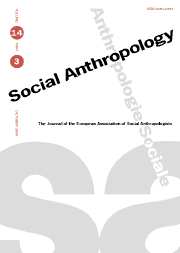No CrossRef data available.
A ritual middle ground? Personhood, ideology and resistance in East Germany
Published online by Cambridge University Press: 06 December 2005
Abstract
The article considers the relationship between the ideological notion of the person and personhood established interpersonally in socialist East Germany. It criticises theories of resistance arguing that both narratives ‘conversationally’ depend on one another. This is explored with regard to a socialist transition ritual, in which ideological and social values come together. Through their co-existence in this ambiguous setting the two narratives reinforce one another. This understanding of a co-dependency of ideology and grass-roots practices is as yet largely absent from the literature. It is, however, necessary in order to understand moral debates and cultural continuity in present eastern Germany.
Cet article s'intéresse à la relation entre la notion idéologique de personne et la personnalité établie de manière interpersonnelle dans l'Allemagne de l'Est socialiste. L'article critique les théories de la résistance en soutenant que les deux récits sont mutuellement dépendants et en ‘conversation’. Ce thème est exploré à travers un rituel de transition socialiste dans lequel sont réunies des valeurs idéologiques et sociales. La coexistence de ces deux narrations dans cette situation ambiguë les renforce mutuellement. Cette compréhension d’une co-dépendance de l'idéologie et des pratiques de la base est encore largement absente de la littérature. Elle est cependant nécessaire pour saisir les débats moraux et la continuité culturelle dans l'Allemagne de l'Est actuelle.
Dieser Artikel behandelt die Beziehung zwischen dem ideologischen Begriff der Person und der durch zwischenmenschliche Interaktionen entstandenen Persona im sozialistischen Ostdeutschland. Widerstandstheorien werden kritisiert und stattdessen wird festgestellt, dass beide Narrative ‘konversationsgleich’ voneinander abhängen. Das wird in Kontext eines sozialistischen Übergangsrituals, im dem ideologische und soziale Werte zusammenkommen, ergründet. Durch ihr Nebeneinanderbestehen in dieser mehrdeutigen Lage verstärken sich die beiden Narrative gegenseitig. Dieses Verständnis einer gegenseitigen Abhängigkeit von Ideologie und grundlegenden Bürgerpraktiken ist bislang in der bestehenden Literatur weitgehend abwesend. Für das Verständnis von Moraldebatten und kultureller Kontinuität im heutigen Ostdeutschland ist es jedoch unabkömmlich.
En el artículo se trata sobre la relación entre la noción ideológica de la persona y la personalidad establecida por medio del contacto interpersonal en la Alemania del Este socialista. Se evalúan las teorías de resistencia al discutir que ambas narrativas dependen ‘conversacionalmente’ la una de la otra. Esto se explora en relación con un ritual de transición socialista, en el cual se mezclan los valores ideológicos con los sociales. A pesar de su coexistencia en este contexto ambiguo, las dos narrativas se refuerzan mutuamente. Esta noción de codeterminación entre la ideología y las prácticas de base (grass-root) se encuentra ausente en la bibliografía. El debate es necesario, al final de cuentas, para entender las discusiones morales y de continuidad cultural en la Alemania del Este de hoy en día.
- Type
- Research Article
- Information
- Copyright
- © Cambridge University Press 2005


